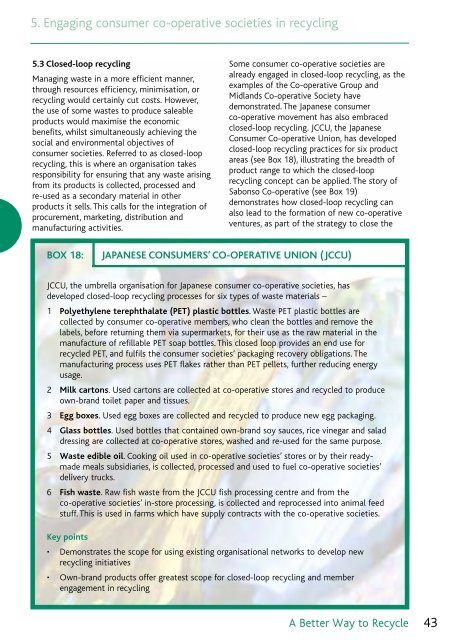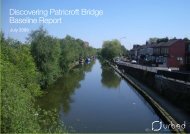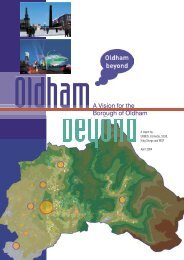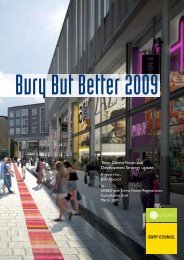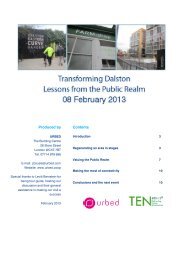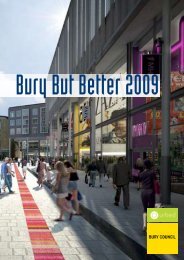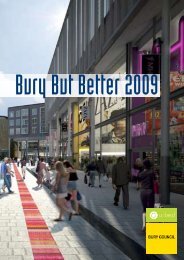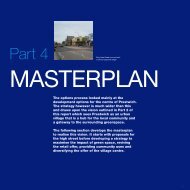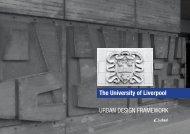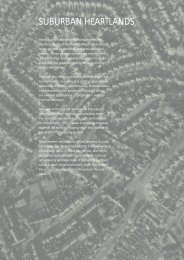A Better Way to Recycle: co-operative and community ... - Urbed
A Better Way to Recycle: co-operative and community ... - Urbed
A Better Way to Recycle: co-operative and community ... - Urbed
Create successful ePaper yourself
Turn your PDF publications into a flip-book with our unique Google optimized e-Paper software.
5. Engaging <strong>co</strong>nsumer <strong>co</strong>-<strong>operative</strong> societies in recycling5.3 Closed-loop recyclingManaging waste in a more efficient manner,through resources efficiency, minimisation, orrecycling would certainly cut <strong>co</strong>sts. However,the use of some wastes <strong>to</strong> produce saleableproducts would maximise the e<strong>co</strong>nomicbenefits, whilst simultaneously achieving thesocial <strong>and</strong> environmental objectives of<strong>co</strong>nsumer societies. Referred <strong>to</strong> as closed-looprecycling, this is where an organisation takesresponsibility for ensuring that any waste arisingfrom its products is <strong>co</strong>llected, processed <strong>and</strong>re-used as a se<strong>co</strong>ndary material in otherproducts it sells. This calls for the integration ofprocurement, marketing, distribution <strong>and</strong>manufacturing activities.Some <strong>co</strong>nsumer <strong>co</strong>-<strong>operative</strong> societies arealready engaged in closed-loop recycling, as theexamples of the Co-<strong>operative</strong> Group <strong>and</strong>Midl<strong>and</strong>s Co-<strong>operative</strong> Society havedemonstrated. The Japanese <strong>co</strong>nsumer<strong>co</strong>-<strong>operative</strong> movement has also embracedclosed-loop recycling. JCCU, the JapaneseConsumer Co-<strong>operative</strong> Union, has developedclosed-loop recycling practices for six productareas (see Box 18), illustrating the breadth ofproduct range <strong>to</strong> which the closed-looprecycling <strong>co</strong>ncept can be applied. The s<strong>to</strong>ry ofSabonso Co-<strong>operative</strong> (see Box 19)demonstrates how closed-loop recycling canalso lead <strong>to</strong> the formation of new <strong>co</strong>-<strong>operative</strong>ventures, as part of the strategy <strong>to</strong> close theBOX 18:JAPANESE CONSUMERS’ CO-OPERATIVE UNION (JCCU)JCCU, the umbrella organisation for Japanese <strong>co</strong>nsumer <strong>co</strong>-<strong>operative</strong> societies, hasdeveloped closed-loop recycling processes for six types of waste materials –1 Polyethylene terephthalate (PET) plastic bottles. Waste PET plastic bottles are<strong>co</strong>llected by <strong>co</strong>nsumer <strong>co</strong>-<strong>operative</strong> members, who clean the bottles <strong>and</strong> remove thelabels, before returning them via supermarkets, for their use as the raw material in themanufacture of refillable PET soap bottles. This closed loop provides an end use forrecycled PET, <strong>and</strong> fulfils the <strong>co</strong>nsumer societies’ packaging re<strong>co</strong>very obligations. Themanufacturing process uses PET flakes rather than PET pellets, further reducing energyusage.2 Milk car<strong>to</strong>ns. Used car<strong>to</strong>ns are <strong>co</strong>llected at <strong>co</strong>-<strong>operative</strong> s<strong>to</strong>res <strong>and</strong> recycled <strong>to</strong> produceown-br<strong>and</strong> <strong>to</strong>ilet paper <strong>and</strong> tissues.3 Egg boxes. Used egg boxes are <strong>co</strong>llected <strong>and</strong> recycled <strong>to</strong> produce new egg packaging.4 Glass bottles. Used bottles that <strong>co</strong>ntained own-br<strong>and</strong> soy sauces, rice vinegar <strong>and</strong> saladdressing are <strong>co</strong>llected at <strong>co</strong>-<strong>operative</strong> s<strong>to</strong>res, washed <strong>and</strong> re-used for the same purpose.5 Waste edible oil. Cooking oil used in <strong>co</strong>-<strong>operative</strong> societies’ s<strong>to</strong>res or by their readymademeals subsidiaries, is <strong>co</strong>llected, processed <strong>and</strong> used <strong>to</strong> fuel <strong>co</strong>-<strong>operative</strong> societies’delivery trucks.6 Fish waste. Raw fish waste from the JCCU fish processing centre <strong>and</strong> from the<strong>co</strong>-<strong>operative</strong> societies’ in-s<strong>to</strong>re processing, is <strong>co</strong>llected <strong>and</strong> reprocessed in<strong>to</strong> animal feedstuff. This is used in farms which have supply <strong>co</strong>ntracts with the <strong>co</strong>-<strong>operative</strong> societies.Key points• Demonstrates the s<strong>co</strong>pe for using existing organisational networks <strong>to</strong> develop newrecycling initiatives• Own-br<strong>and</strong> products offer greatest s<strong>co</strong>pe for closed-loop recycling <strong>and</strong> memberengagement in recyclingA <strong>Better</strong> <strong>Way</strong> <strong>to</strong> <strong>Recycle</strong> 43


